Dimitrios Danopoulos
AIE4ML: An End-to-End Framework for Compiling Neural Networks for the Next Generation of AMD AI Engines
Dec 17, 2025
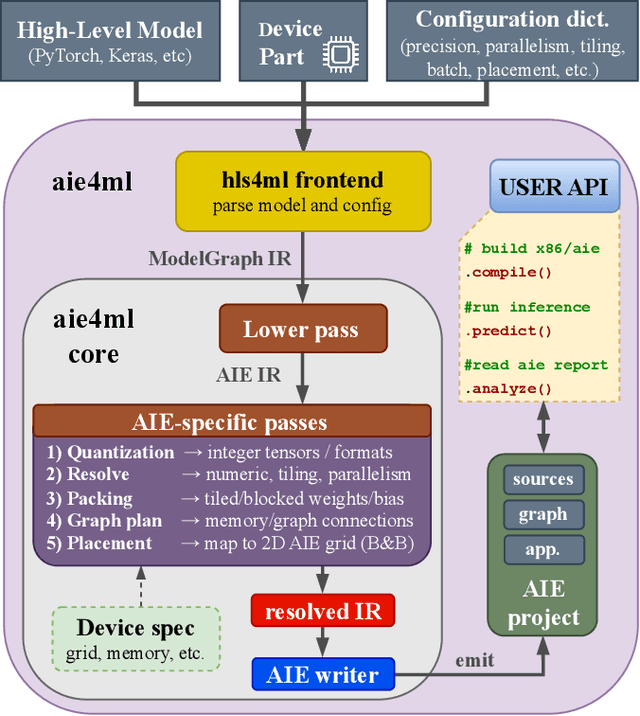
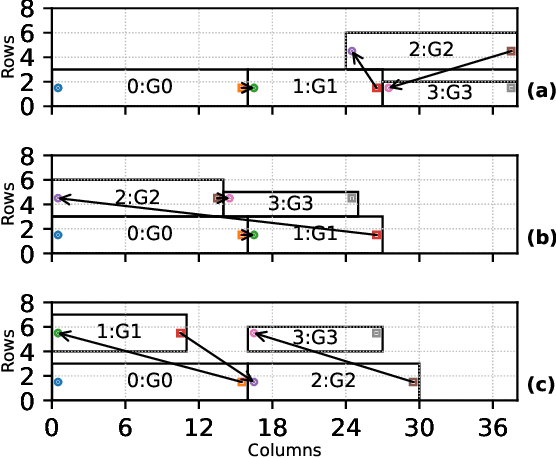

Abstract:Efficient AI inference on AMD's Versal AI Engine (AIE) is challenging due to tightly coupled VLIW execution, explicit datapaths, and local memory management. Prior work focused on first-generation AIE kernel optimizations, without tackling full neural network execution across the 2D array. In this work, we present AIE4ML, the first comprehensive framework for converting AI models automatically into optimized firmware targeting the AIE-ML generation devices, also with forward compatibility for the newer AIE-MLv2 architecture. At the single-kernel level, we attain performance close to the architectural peak. At the graph and system levels, we provide a structured parallelization method that can scale across the 2D AIE-ML fabric and exploit its dedicated memory tiles to stay entirely on-chip throughout the model execution. As a demonstration, we designed a generalized and highly efficient linear-layer implementation with intrinsic support for fused bias addition and ReLU activation. Also, as our framework necessitates the generation of multi-layer implementations, our approach systematically derives deterministic, compact, and topology-optimized placements tailored to the physical 2D grid of the device through a novel graph placement and search algorithm. Finally, the framework seamlessly accepts quantized models imported from high-level tools such as hls4ml or PyTorch while preserving bit-exactness. In layer scaling benchmarks, we achieve up to 98.6% efficiency relative to the single-kernel baseline, utilizing 296 of 304 AIE tiles (97.4%) of the device with entirely on-chip data movement. With evaluations across real-world model topologies, we demonstrate that AIE4ML delivers GPU-class throughput under microsecond latency constraints, making it a practical companion for ultra-low-latency environments such as trigger systems in particle physics experiments.
Evaluation of Resource-Efficient Crater Detectors on Embedded Systems
May 27, 2024
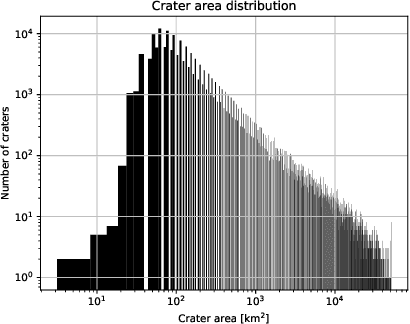
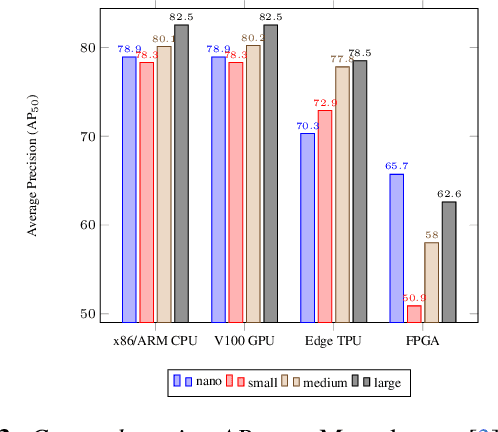
Abstract:Real-time analysis of Martian craters is crucial for mission-critical operations, including safe landings and geological exploration. This work leverages the latest breakthroughs for on-the-edge crater detection aboard spacecraft. We rigorously benchmark several YOLO networks using a Mars craters dataset, analyzing their performance on embedded systems with a focus on optimization for low-power devices. We optimize this process for a new wave of cost-effective, commercial-off-the-shelf-based smaller satellites. Implementations on diverse platforms, including Google Coral Edge TPU, AMD Versal SoC VCK190, Nvidia Jetson Nano and Jetson AGX Orin, undergo a detailed trade-off analysis. Our findings identify optimal network-device pairings, enhancing the feasibility of crater detection on resource-constrained hardware and setting a new precedent for efficient and resilient extraterrestrial imaging. Code at: https://github.com/billpsomas/mars_crater_detection.
TransAxx: Efficient Transformers with Approximate Computing
Feb 12, 2024Abstract:Vision Transformer (ViT) models which were recently introduced by the transformer architecture have shown to be very competitive and often become a popular alternative to Convolutional Neural Networks (CNNs). However, the high computational requirements of these models limit their practical applicability especially on low-power devices. Current state-of-the-art employs approximate multipliers to address the highly increased compute demands of DNN accelerators but no prior research has explored their use on ViT models. In this work we propose TransAxx, a framework based on the popular PyTorch library that enables fast inherent support for approximate arithmetic to seamlessly evaluate the impact of approximate computing on DNNs such as ViT models. Using TransAxx we analyze the sensitivity of transformer models on the ImageNet dataset to approximate multiplications and perform approximate-aware finetuning to regain accuracy. Furthermore, we propose a methodology to generate approximate accelerators for ViT models. Our approach uses a Monte Carlo Tree Search (MCTS) algorithm to efficiently search the space of possible configurations using a hardware-driven hand-crafted policy. Our evaluation demonstrates the efficacy of our methodology in achieving significant trade-offs between accuracy and power, resulting in substantial gains without compromising on performance.
AdaPT: Fast Emulation of Approximate DNN Accelerators in PyTorch
Mar 08, 2022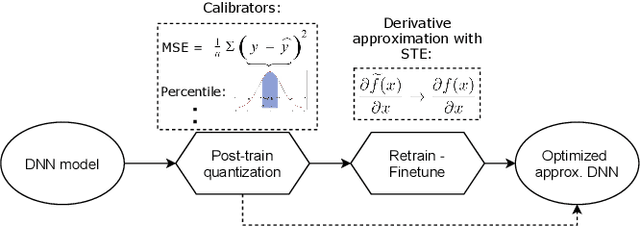
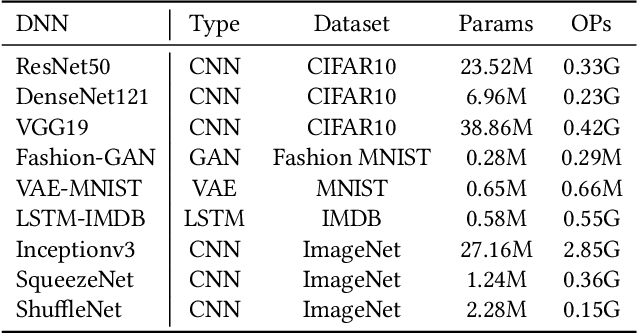
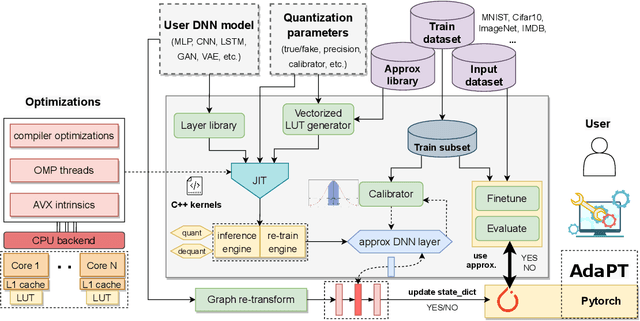

Abstract:Current state-of-the-art employs approximate multipliers to address the highly increased power demands of DNN accelerators. However, evaluating the accuracy of approximate DNNs is cumbersome due to the lack of adequate support for approximate arithmetic in DNN frameworks. We address this inefficiency by presenting AdaPT, a fast emulation framework that extends PyTorch to support approximate inference as well as approximation-aware retraining. AdaPT can be seamlessly deployed and is compatible with the most DNNs. We evaluate the framework on several DNN models and application fields including CNNs, LSTMs, and GANs for a number of approximate multipliers with distinct bitwidth values. The results show substantial error recovery from approximate re-training and reduced inference time up to 53.9x with respect to the baseline approximate implementation.
 Add to Chrome
Add to Chrome Add to Firefox
Add to Firefox Add to Edge
Add to Edge